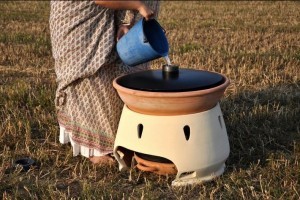Source: earthtechling.com
Published: August 18, 2012

Image via Gabriele Diamanti/Core 77
Without access to fresh, clean drinking water, millions of people around the world must endure compromised health conditions and a poor standard of living. Many, mostly women, are forced to walk long hours to find water supplies, which are often polluted, only to face the backbreaking task of carrying it home. By the year 2025, 2/3 of the world population will lack sufficient fresh water, so this problem is only going to get worse if we don’t find a practical solution.
Designer Gabriele Diamanti has spent many years traveling the world, and seen this problem repeated over and over. He decided to use his knowledge of industrial design, renewable energy, and social issues to create a possible solution. What emerged is something Diamanti likes to call a solar still: a device that takes salt or brackish water and creates something drinkable.
Called “Eliodomestico,” which roughly translated means “Sun-household”, the device is low-tech and low-cost, made of simple, replaceable parts that will be familiar to those who use it. To use the still, it must first be filled with salt or brackish water during the morning hours. Once the boiler is tightly sealed, climbing temperatures cause the pressure inside to increase. The resulting steam is forced downwards through a connection pipe and collects in the lid, which acts as a condenser, turning the steam into fresh water.
Eventually, the solar-powered home distillery could provide benefits that extend far beyond fresh water. “It can deliver very positive outcomes for the local economies, because it’s designed to be produced (and eventually repaired) by local craftsmen, thus generating a market,” writes Diamanti. “Craftsmen from many different places can produce the distiller, using the materials that they already can manage. The production techniques are very sustainable, already present in the developing countries, so there is no need to teach anything to the craftsmen.” The project recently won a Core77 Design Award for Social Impact, and Diamanti hopes that soon, people will adapt the opensource design to solve problems in their own region.
